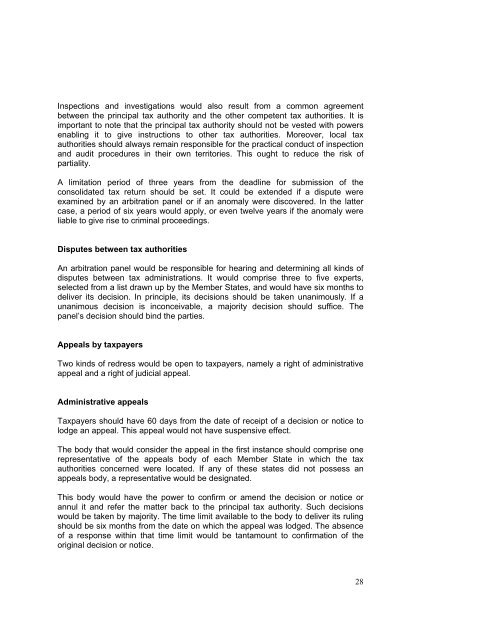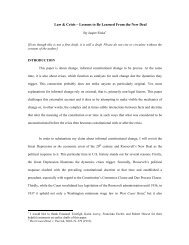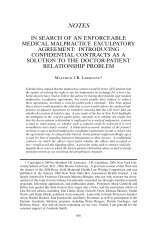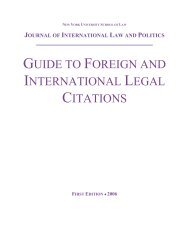An outline of the CCCTB (Common Consolidated Corporate Tax ...
An outline of the CCCTB (Common Consolidated Corporate Tax ...
An outline of the CCCTB (Common Consolidated Corporate Tax ...
You also want an ePaper? Increase the reach of your titles
YUMPU automatically turns print PDFs into web optimized ePapers that Google loves.
Inspections and investigations would also result from a common agreement<br />
between <strong>the</strong> principal tax authority and <strong>the</strong> o<strong>the</strong>r competent tax authorities. It is<br />
important to note that <strong>the</strong> principal tax authority should not be vested with powers<br />
enabling it to give instructions to o<strong>the</strong>r tax authorities. Moreover, local tax<br />
authorities should always remain responsible for <strong>the</strong> practical conduct <strong>of</strong> inspection<br />
and audit procedures in <strong>the</strong>ir own territories. This ought to reduce <strong>the</strong> risk <strong>of</strong><br />
partiality.<br />
A limitation period <strong>of</strong> three years from <strong>the</strong> deadline for submission <strong>of</strong> <strong>the</strong><br />
consolidated tax return should be set. It could be extended if a dispute were<br />
examined by an arbitration panel or if an anomaly were discovered. In <strong>the</strong> latter<br />
case, a period <strong>of</strong> six years would apply, or even twelve years if <strong>the</strong> anomaly were<br />
liable to give rise to criminal proceedings.<br />
Disputes between tax authorities<br />
<strong>An</strong> arbitration panel would be responsible for hearing and determining all kinds <strong>of</strong><br />
disputes between tax administrations. It would comprise three to five experts,<br />
selected from a list drawn up by <strong>the</strong> Member States, and would have six months to<br />
deliver its decision. In principle, its decisions should be taken unanimously. If a<br />
unanimous decision is inconceivable, a majority decision should suffice. The<br />
panel’s decision should bind <strong>the</strong> parties.<br />
Appeals by taxpayers<br />
Two kinds <strong>of</strong> redress would be open to taxpayers, namely a right <strong>of</strong> administrative<br />
appeal and a right <strong>of</strong> judicial appeal.<br />
Administrative appeals<br />
<strong>Tax</strong>payers should have 60 days from <strong>the</strong> date <strong>of</strong> receipt <strong>of</strong> a decision or notice to<br />
lodge an appeal. This appeal would not have suspensive effect.<br />
The body that would consider <strong>the</strong> appeal in <strong>the</strong> first instance should comprise one<br />
representative <strong>of</strong> <strong>the</strong> appeals body <strong>of</strong> each Member State in which <strong>the</strong> tax<br />
authorities concerned were located. If any <strong>of</strong> <strong>the</strong>se states did not possess an<br />
appeals body, a representative would be designated.<br />
This body would have <strong>the</strong> power to confirm or amend <strong>the</strong> decision or notice or<br />
annul it and refer <strong>the</strong> matter back to <strong>the</strong> principal tax authority. Such decisions<br />
would be taken by majority. The time limit available to <strong>the</strong> body to deliver its ruling<br />
should be six months from <strong>the</strong> date on which <strong>the</strong> appeal was lodged. The absence<br />
<strong>of</strong> a response within that time limit would be tantamount to confirmation <strong>of</strong> <strong>the</strong><br />
original decision or notice.<br />
28
















